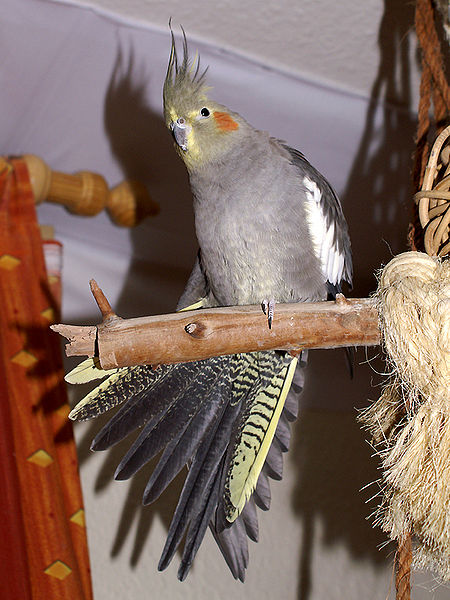 Recently, my 14 year old female cockatiel, Charlie was pacing at the bottom of her cage (her usual method of begging to be let out) when she got her leg caught in the grating of the cage. Panicked, I raced forward to help her, but unfortunately my bird’s panic took over and she injured her leg trying to free herself. I knew immediately she had broken it because she could not use it at all and there was blood on her perch, indicating that the bone had gone through the skin. I rushed her to the emergency vet and 4 hours and $360 later, she was ready to go home, dressed in a splint and bird sized e-collar. She’s recovering well, which is great news, however the cost of this endeavor got me to thinking: would pet insurance be worth the investment?
Recently, my 14 year old female cockatiel, Charlie was pacing at the bottom of her cage (her usual method of begging to be let out) when she got her leg caught in the grating of the cage. Panicked, I raced forward to help her, but unfortunately my bird’s panic took over and she injured her leg trying to free herself. I knew immediately she had broken it because she could not use it at all and there was blood on her perch, indicating that the bone had gone through the skin. I rushed her to the emergency vet and 4 hours and $360 later, she was ready to go home, dressed in a splint and bird sized e-collar. She’s recovering well, which is great news, however the cost of this endeavor got me to thinking: would pet insurance be worth the investment?
The luxury of insurance to the average pet owner may seem like an unnecessary expense, but emergencies can occur at any time and very expensive vet treatment may be required. Pet insurance is comparable to health insurance in human terms. In exchange for a monthly fee, most policies will cover up to 90% of the cost of veterinary care should your pet become sick or injured, and some may even cover the cost of vaccinations, physical therapy, medications, or even dental care depending on the policy. However, pet insurance is not technically health insurance. It is actually a form of property insurance (even though most of us like to think of our pets more as family than property!), so policy holders usually have to pay the entire cost of care up front and then submit the claim to the insurance company for reimbursement. Be sure you’re ready to cover the cost of services that may be administered when you take your pet to the vet.
I always recommend that prospective pet owners start a savings fund dedicated just to the health care of their pets, just in case. Of course we hope that nothing bad ever happens to our pets and we do everything in our power to feed them right and take good care of them, but as pets age, the possibility of major problems like cancer and arthritis does increase. As a pet owner, you may eventually be faced with the decision between expensive treatments for health issues or possibly having your pet be put to sleep–sadly, a decision which may be based largely on how much you are able to spend vet care. Surgeries and other treatments can cost hundreds to thousands of dollars, and most people just don’t have that kind of money laying around. Dedicated savings and pet insurance can provide pet owners with a safety net to help when these harrowing situations arise.
Before you dive into a pet insurance policy, but sure to look at the terms and guidelines to see what best suits your situation. Questions you should ask include:
What types of animals does this policy cover?
Some policies will only cover cats and dogs, while others cover everything from rats to race horses. Most likely, the insurance company will base their rates on the life expectancy of your pet. While parrots can live 60 years or more, hamsters may live up to about 3 years, and a policy may have to be altered with this in mind.
Are Pre-existing, congenital and hereditary conditions (heart defects, cataracts, diabetes, ect.) covered in the plan?
Some plans cover emergencies only and not pre-existing or genetic conditions. Let’s say you have a dog who has torn his ACL in the past. If you decide to insure your dog, and he has had surgery to repair his leg before you buy the policy, the policy may not cover costs if he tears his ACL again or injures his legs in any other way as a result of having a weak ACL. Some animals ar prone to certain disorders and health issues, for example rats are prone to tumors. Some policies, knowing this, will not cover tumors in rats because it is very likely yours may develop a tumor in its lifetime.
How is my reimbursement calculated?
Some policies calculate your reimbursement based on your actual vet bill, others may stick to a benefit schedule. Some may have a flat rate of pay out, which means they will only cover up to a specified amount, no matter how high the bill is.
Are there any limits to my pet’s benefits?
Some policies only cover a certain number of emergencies annually or in a lifetime. This may even include illnesses and accidents, so it is important to research the policy and read the fine print.
There is a lot to consider before picking a policy, so it is important to research the company and policy you are interested in before committing. I probably won’t make the investment for Charlie since she’s older, but should I decide to get another bird, I intend on investing in an insurance policy, particularly to cover emergencies. It is my hope that I will never have to use it!
Until next time,
Jess
 That Pet Blog That Pet Place Pet Blog
That Pet Blog That Pet Place Pet Blog

Jess you pick great topics I have to say!! I am pro pet insurance but to an extent. I have purchased pet insurance policies on all of my cats from the moment I adopt them. Working in a veterinary clinic & & in the pet industry as a pet sitter I have seen how the medical big rack up quick!
My cat Kizmet (now 11 years old) came down with a bad eye infection at 6 months old. She ended up needing eye surgery. Having Insurance saved me a ton of money!
But on the other end of it your vet has to know how to properly fill out the paper work & claim forms! When my other cat Karley became suddenly ill I wasn’t thinking about veterinary paperwork – I was thinking get her better! But due to a brain tumor I lost her within 48 hours of the first sign. When I got the check back from the insurance company I only received a 10% reimbursement form the insurance company. When I called the insurance company to inquire I was infirmed they were not provided with the proper documentation. It was a BIG MESS to attempt to fix with my veterinarian. They just didn’t seem to grasp what the insurance company was looking for – a detailed explanation. After a telephone conference between the insurance company & the veterinarian I got a little bit more money back but not near what I should have!
When my oldest cat Kizmet turn 10 years old & it came time to renew her BASIC policy I was hit with sticker shock! She NEVER had a issue other than the eye problem when she was 56 months old. They wanted $300/year for a BASIC plan for a 10 year old cat. Now I love Kizzy to death but I’m sorry I can not justify spending $300/year on a basic health insurance policy! 6 months after I cancelled her policy she was diagnosed with Chronic Renal Failure. Do I regret my decision? Not at all! I pay my vet bills without question.
Kaize my 2 year old soon to be 3 yrs old has a basic insurance policy which is like $60/year. Shes never had an issue & I’ll continue coverage on her as long as I can justify the cost for her age & condition.
My sisters 8 year old cat has a gold Insurance policy but Cassie is the million dollar cat! I paid $25 for her as kitten as a Christmas present for my sister. Cassie had a Tumor removed from her eye which ran my sister THOUSANDS. She has horrible dental problems, and had exploratory surgery about 2 years ago. Cassie has had issues all her life – so that is justified top keep the policy active on her.
The additional insurance you can purchase for vaccines has its pros & cons as well. The company I have you pay about $100/year for the additional coverage of routine care such as wellness exams, vaccinations and teeth cleaning, Flea and/or Heartworm Preventive , stool check , deworming, & Microchip. For an indoor cat this coverage is kind of pointless – you get reimbursed $5-$10 per vaccination & maybe do a stool check. But for a dog with heartworm testing & preventative, flea & tick med & vaccinations it is worth purchasing the supplemental care package.
You have to look at what you are paying for & how much you are paying & the likely hood of you using it.
Most pets these days are already considered members of the family. Aside from that, some people depend on their beloved animals for many different things. Take for example guide dogs that help visually impaired individuals to get around safely and conveniently as well as the sniffing canines that help authorities look after the public’s interest. For all these reasons, animals need protection from diseases and injuries so they can continue giving joy and assistance to humans. Hence, investing in pet insurance is viewed as necessary, rather than a luxury. However, with the increasing rates of insurance premiums, pet owners doubt the significance of these policies. Others may resort to opening a separate savings account for emergency purposes that will involve their pets. Although there is nothing wrong with it, it is important to keep in mind that accidents and emergency situations can happen when least expected. Pet insurance covers a lot of things that can cost a fortune and this is where it comes in handy for the owners. For example, if a pet was run over by a speeding vehicle and broke some bones, saving a few hundred pounds in the bank may not be enough to pay off medical bills, not to mention the medications that the owner has to buy to sustain treatment. In other words, pet insurance coverage takes away the financial burden from the owners.